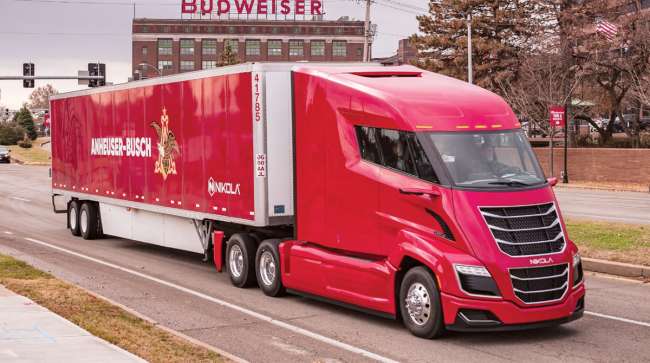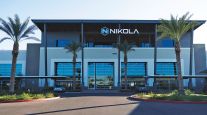Senior Reporter
Nikola Posts Q2 Loss, Stays Focused on Growth Strategy

[Stay on top of transportation news: Get TTNews in your inbox.]
Just two months after becoming a publicly traded company, Nikola Corp. reported that net losses widened versus year-ago levels as the company continues investing in the buildup toward the introduction of its electric trucks.
Nikola on Aug. 4 reported a Q2 net loss of $86.6 million, or 33 cents per share, compared with a net loss of $17.2 million, or 6 cents a share, a year ago. Zacks Investment Research was expecting a per-share loss of 14 cents.
On July 23, Nikola broke ground on a 1 million-square-foot manufacturing facility in Coolidge, Ariz., where it plans to build its Class 8 Nikola Tre truck and its consumer-facing Badger pickup truck, both of which will use its hydrogen fuel cell-backed electric propulsion system. During the quarter, the company said spending on research and development increased to $42.5 million from $11.9 million a year ago. General, sales and administrative expenses increased to $44.1 million from $5.3 million last year.

Transport Topics introduces its newest digital interview series, Newsmakers, aimed at helping leaders in trucking and freight transportation navigate turbulent times. Audience members will gain access to the industry's leading expert in their particular field and the thoughtful moderation of a Transport Topics journalist. Our second episode — "The Evolution of Electric Trucks" — featured Nikola founder and executive chairman Trevor Milton. To view the replay, complete this form.
Initially, the Tre will be built and tested in Ulm, Germany. Nikola expects those trucks to be available for customers in the fourth quarter of 2021. Zacks expects Nikola to post $114 million in sales in 2021, with much of the revenue coming during the second half of the year.
“In the second quarter of 2020, Nikola met predetermined milestones on our journey toward becoming the zero-emissions transportation leader in the global heavy truck market,” CEO Mark Russell said in a statement with the earnings release.
Russell emphasized that Nikola is doing its best to save cash while spending on critical capital investments such as the U.S. factory.

Milton
“We spent $11 million less than what was projected in the quarter, so we’re showing good discipline on the spending front. And since we’re in a pre-revenue position every one of those dollars has to come from our investors. We know that’s critical, and we take that trust very seriously,” Russell said on a conference call with reporters and analysts. On the conference call, the company said it has $698 million in cash on hand, and is expecting to raise another $264.5 million later this year.
Nikola became a publicly traded company in June after merging with a publicly listed, special-purpose acquisition company called VectoIQ Acquisition Corp. Nikola is now traded on the Nasdaq exchange under the symbol NKLA. Since it went public, Nikola’s stock price has doubled.
In a recent interview with Transport Topics, Nikola’s Founder and Executive Chairman Trevor Milton said he believes the hydrogen fuel cell technology that powers his company’s trucks can place Nikola at the forefront of global efforts to toughen clean-air rules while also providing a truck that meets the needs of commercial fleets.
“When I built Nikola, I wanted to build a truck that would actually create a desire for people to move away from diesel with better performance, better efficiency. That’s what’s going to convert people away from diesel to zero-emissions,” he said July 28 during an appearance on TT’s Newsmakers program.
That said, Milton believes that movement by governments around the world during the next 10 to 15 years to take diesel-powered trucks off the road will also drive the shift toward zero-emission vehicles.
Nikola’s business model calls for trucking companies to buy not only the trucks from Nikola but also the hydrogen fuel that will power the vehicles.
The pricing strategy is to bundle truck, fuel and maintenance expenses into a single long-term lease. The company plans to set up a network of at least 700 hydrogen fueling stations on dedicated routes throughout the country where long-distance trucks would be able to obtain hydrogen at about the same time it takes to fuel a diesel truck.
Anheuser-Busch, the parent company of Budweiser beer, announced last year it plans to order 800 hydrogen-electric Nikola semi-trucks as the iconic beer company seeks to turn its entire longhaul vehicle fleet into a zero-emission operation. As a starting point, by 2025, Anheuser-Busch said it would reduce carbon emissions by 25%.
Want more news? Listen to today's daily briefing:
Subscribe: Apple Podcasts | Spotify | Amazon Alexa | Google Assistant | More




